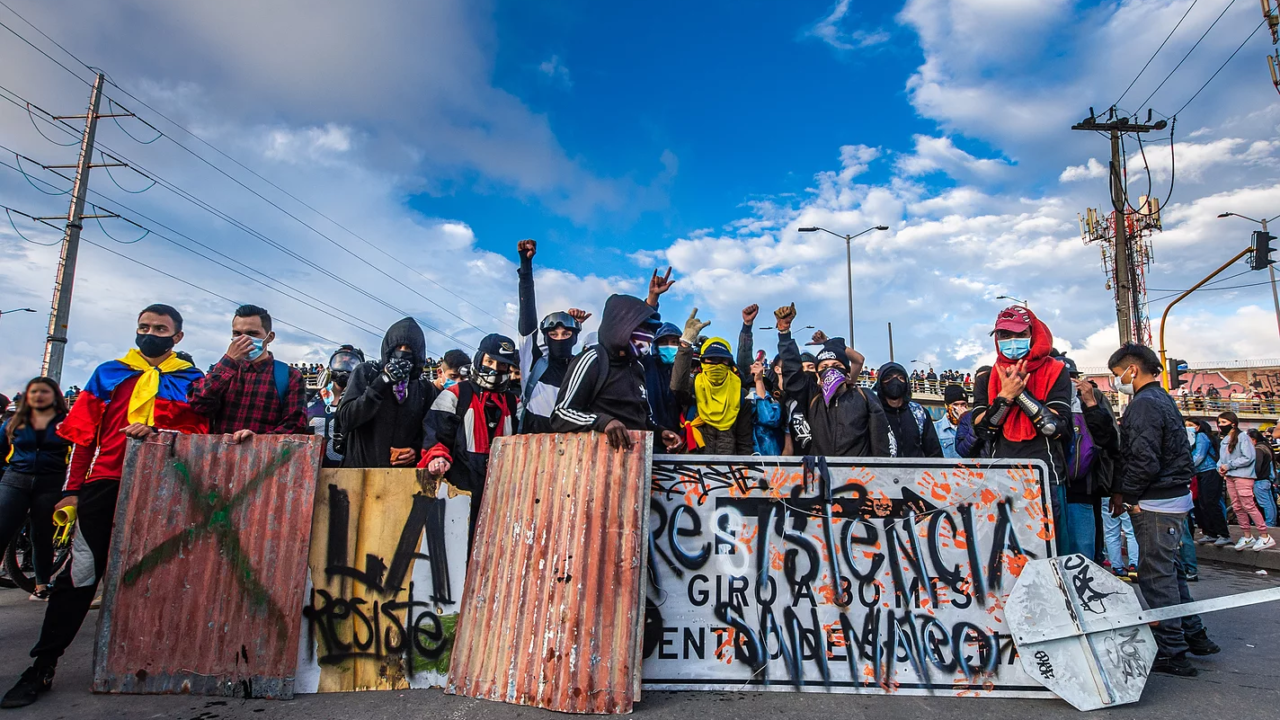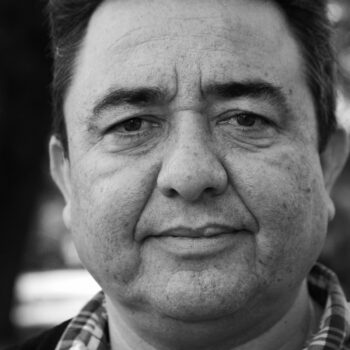Colombia’s President Iván Duque came to power two years ago on a neoliberal, pro-business agenda, promising more jobs and less taxes. His decision to break that promise two weeks ago couldn’t have come at a worse time: in the middle of a mortal pandemic that has hit Colombia harder than virtually any other country in the region. Duque proposed raising the sales tax, a form of taxation that most negatively impacts those with the least money to spend. The tax reforms are part of a broader “paquetazo neoliberal,” or “neoliberal package,” which also includes changes to the pension system, the healthcare system, and the labor code, all of which, if implemented, would put a greater squeeze on struggling Colombians.
The people’s response to the “tax reform” was massive and decisive. A coalition of unions and civic organizations called for a national strike on Wednesday, April 28, and hundreds of thousands of people from across Colombia poured into the streets. By Sunday, truck drivers had joined the strike, a move that forced Duque to withdraw the tax, and the Minister of Finance who authored it resigned. The government’s reversal was a victory for Colombians, but the strike continues. In response, the government has deployed the national police, the army, riot cops, and vigilantes, aiming to stop the mobilizations by brutalizing the population. Multiple videos show uniformed and non-uniformed police utilizing live ammunition against protesters in broad daylight. Cali has been the epicenter of the discontent, and the city that has borne the brunt of the government’s military response.
On May 7, I sat down with Jacobo Albán — a member of Partido Comunes, a successor organization of the Revolutionary Armed Forces of Colombia (FARC) — to talk about the years of work leading to this moment, the opportunity it presents for mass political education, and how those living outside Colombia can support the demonstrations. This interview has been edited and condensed.
What organization do you belong to?
I am working on a communications campaign called “Let the horrible night cease.” The horrible night is a phrase that appears in our national anthem: “the horrible night has ended”, referring to when the Spaniards left. We picked up on that feeling and said: the horrible night has not ceased, and it’s imperative for it to stop.
How did the mobilizations start?
The current mobilization is the result of the accumulated ant work of many years, decades, which has sown in the popular consciousness what’s coming out today. The mobilization is a school too. The people are learning how to block streets, when they are attacked with tear gas, they put the canisters in water with baking soda. The women in the houses are the ones passing the water, caring for the wounded, because the government has already taken it to another level. There has been a military response to the social protest because we have a government whose script is the theme of war. That machinery is well oiled after more than fifty years of warfare. But they don’t know how to deal with crowds of people on the street.
It’s been almost two weeks of mobilizations.
This is possible in this country because a window of opportunity has been opened after the signing of the Peace Accords [in 2016]. People realized they can transform things by taking to the streets. That realization is what the government intends to reverse. When the government talks about breaking the Peace Accords, it’s because it wants to go back to the war script. Remember that in Colombia, social movement struggles became a confrontation between armed apparatuses. Right now, a possibility of popular participation has opened up.
We know Cali has been the epicenter of the movement and the focus of concentrated state violence, with fatal results. How is the situation in Cali?
It’s not only Cali, it’s the whole Valle del Cauca. Communities are turning themselves out, creating their own spaces of debate and resistance. These may not be the largest or the most strategic points of the city, but they are in the middle of the neighborhoods. People go out, set a fire in the street, gather, set a barricade to block traffic. Strategically speaking, the neighbors’ barricades may not necessarily stop the city, but since it has been several days, there are times when the neighbors’ barricades have moved to more strategic points of the city. This is a collective work. There are no small efforts. We want the old ladies, the home makers, the people who sell empanadas on the street corners, the old men, to feel that they are also part of this movement.
The movement had a quick victory, but it was clearly not enough.
There is deep distrust in the declarations of the rulers. Until today, the tax reform has not been withdrawn from Congress. It is something that they said, announced, but did not withdraw the tax reform. Anyway, the president says that they were going to arm it with stuff we can agree on. What does that imply? People understood right away they meant they’d put some make up on the tax reform. People know this is a lie.
In addition, the finance minister resigned. But it’s a joke, what they did was casting. The Vice Minister of Commerce was brought in, and the Vice Minister of Finance became the Minister of Commerce. They have the same policies.
The interesting thing about all this is that these realizations don’t come from leftists political sectors. People are realizing these things on the street, in the conversations with their neighbors. That this is the most important thing, the political education that these days of mobilization are going to generate. These days of mobilization represent I don’t know how many political workshops condensed in a few days.
The city is virtually occupied by the military. Since the strike started on April 28, strategic points of the city remain taken by community residents and students.
These resistance points have been mobile. Some new ones have emerged. There are moments in which even the human rights organizations have told us: retreat, go home, because, as I said, the government ‘s response has been of a military nature. Sometimes people withdraw from their resistance points, but they take the spot again the next day.
What can the international community do to help?
Put pressure on diplomatic entities, embassies, consulates. The issue of communications is very important for us, sharing information. The place to hurt authoritarian leaders is always their pocket, so if there is pressure on certain contracts and economic activity, whatever can be done so that they respect human rights.
Your party is the political successor of the FARC [Revolutionary Armed Forces of Colombia]. How are things going since the Peace Accords between the government and the FARC were signed in 2016.
We are in the process of reincorporation back to legality and exercising the rights and guarantees that are stipulated in the constitution. Social protest is one of those rights.

